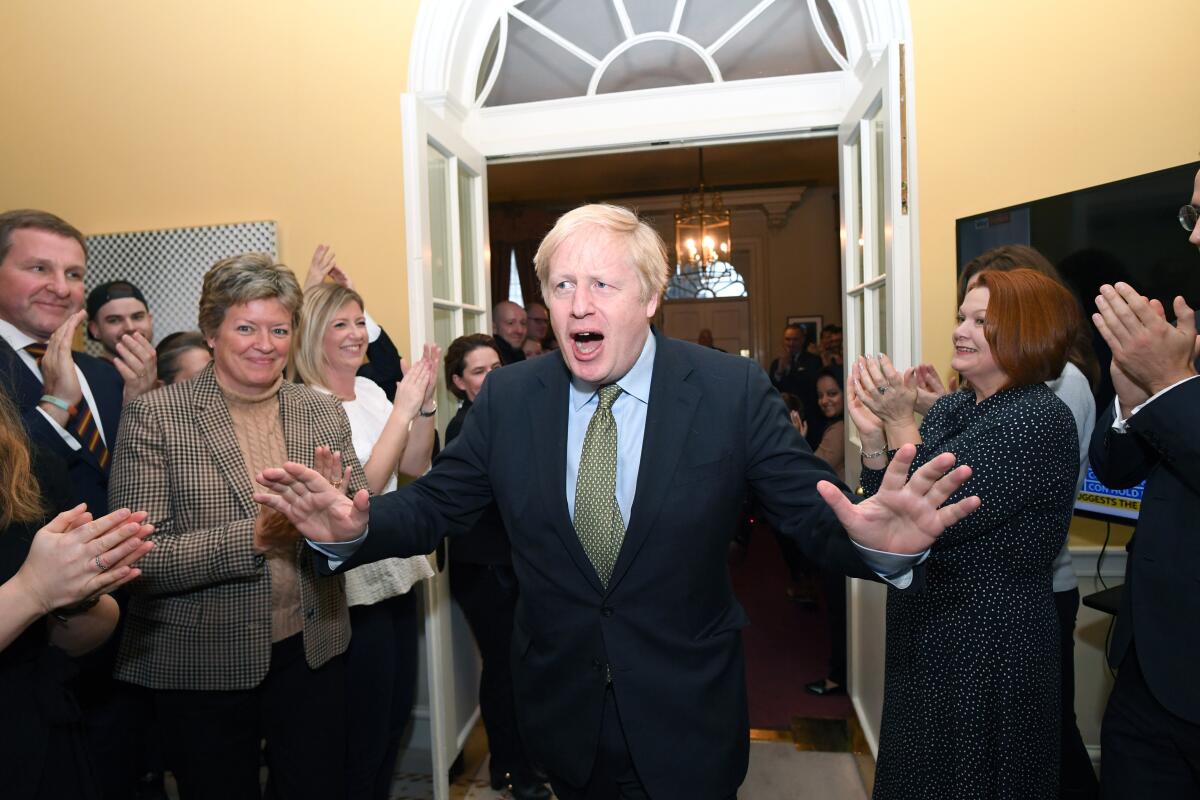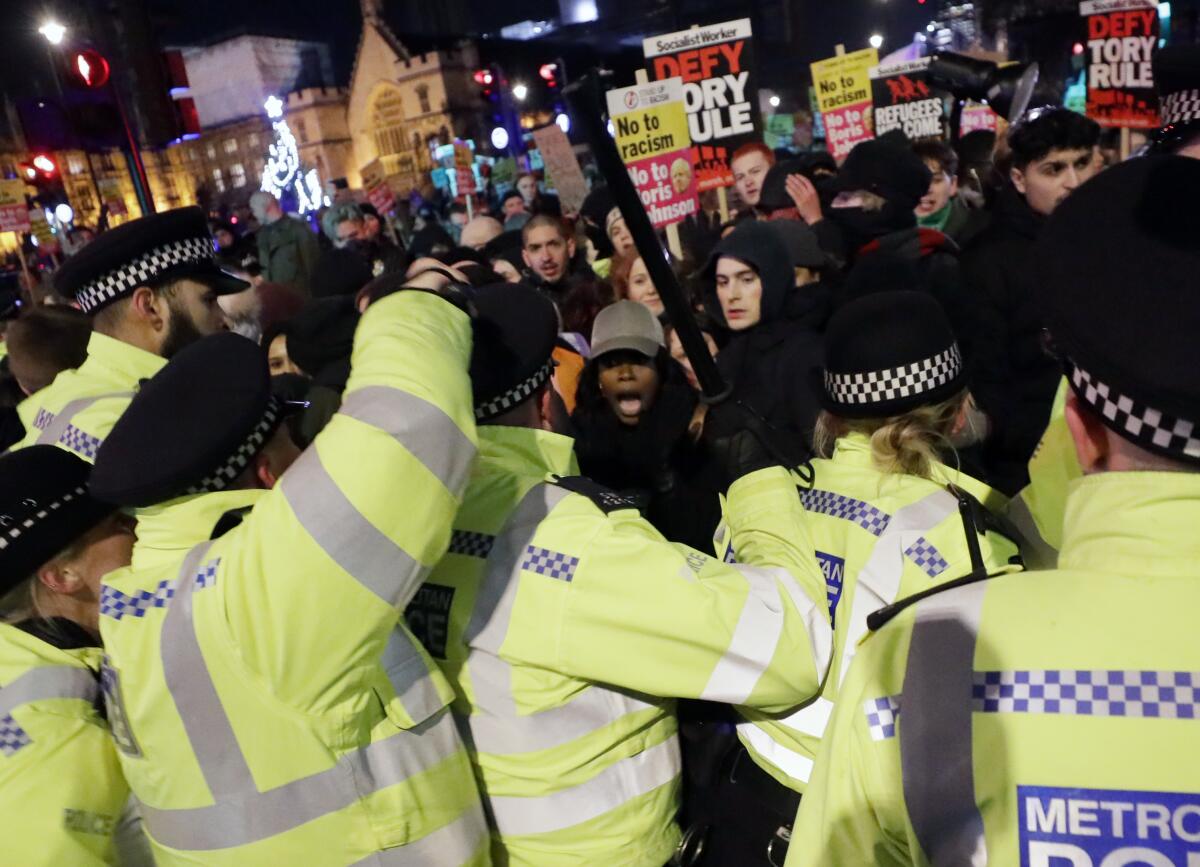After bruising campaign, victorious Johnson searches for Brexit unity. It may prove elusive

LONDON — British Prime Minister Boris Johnson has often seemed much in the mold of President Trump — gleefully shattering political norms, challenging the legitimacy of democratic institutions, accusing those who disagree with him of betraying the country.
On Friday, however, as final ballot-counting sealed an overwhelming victory for Johnson’s Conservative Party after a scorched-earth election centered on Britain’s planned exit from the European Union, his message appeared quite different: “Let the healing begin.”
Johnson’s conciliatory words, in a nationally televised address delivered in front of the iconic dark-brick facade of 10 Downing Street, were aimed, he said, at those who voted against him, or who voted for him while figuratively holding their noses, or were gripped with despair over his intention to carry out Brexit by Jan. 31, a scant seven weeks away.
“This country deserves a break from wrangling, a break from politics, and a permanent break from talking about Brexit,” he said. Pugnacious on the campaign trail, the prime minister spoke soothingly of “closure.”

For more than three years, the battle of Brexit has torn at the fabric of British society, turning neighbors and family members against one another, toppling two prime ministers, throwing business dealings small and large into expensive uncertainty, pitting the native-born against immigrants.
Now, fully empowered to push through his departure plan, the prime minister talked like a Europhile, praising “Remainers” for their “good and positive feelings of warmth and sympathy towards the nations of Europe.”
Relations between Britain and the EU, he said, should be those of “friends and sovereign equals.”
But after so raw and divisive a campaign, that may be a highly aspirational sentiment. Some observers likened Johnson to the dog who finally caught the car he was chasing — a politician who, having achieved a five-year term and a commanding parliamentary majority, suddenly realizes he is expected to deliver on a daunting agenda.
“The test will not be what he says in the days after the election but what he does in the next five years,” said Matt Cole, a political historian at the University of Birmingham.
It’s not even clear that the prime minister will be able to hold the United Kingdom together, with Brexit opening deep fissures in Scotland and Northern Ireland. And despite implied finality of Johnson’s much-repeated campaign slogan — “Get Brexit done!” — the planned departure date will in fact trigger months or years of complex negotiations with the EU.
Brexit may also cause the country significant economic harm, experts have said, and already many EU nationals are making the difficult decision to pack up and leave, sometimes after years or decades in Britain.
The prime minister has promised to negotiate a comprehensive new accord with the bloc before the end of 2020. But the president of the European Commission, Ursula von der Leyen, warned Friday that 11 months was an “extremely short” window for such a monumental task. Many critics, both at home and on the EU side, doubt it can be done, again raising the specter of a disorderly split.
“It’s not only about trade,” Von der Leyen told a news conference in Brussels. “We are also speaking about education, transport, fisheries — many, many other fields are in the portfolio to be negotiated.”
European leaders who had once hoped to keep Britain in the EU fold expressed relief that the vote had provided some long-sought clarity about the intentions of the British government. That view was echoed by investors, with stocks and the British pound buoyed by the welcome prospect of greater economic certainty.
With the vote-counting virtually complete, Johnson’s Conservative Party secured its biggest vote share in more than 30 years, winning 365 seats, while the main opposition Labor’s allotment in the 650-member House of Commons plunged to the lowest level since 1935, 203 seats.
Despite the carefully statesmanlike tone he struck in his address, Johnson reveled in the party’s victory. He’d had cause for concern: In the days before the vote, some polls suggested that Labor was closing the overall gap. He even appeared to have a last-minute scare that he might lose his own parliamentary seat, though in the end he prevailed.
“We did it — we pulled it off, didn’t we?” he crowed to a crowd of supporters Friday. The result, he said, showed that leaving the EU was the “irrefutable, irresistible, unarguable decision” of the voters.
Trump, who has has consistently cheered Britain’s planned break with the EU, discomfiting European allies such as Germany and France, celebrated Johnson’s win.
But the prime minister will have to strike a delicate balance in dealing with the mercurial U.S. president, who tends to view alliances in transactional terms. Trump told reporters at the White House on Friday he expects Brexit to pay commercial dividends for the United States, in the form of “a tremendous amount of trade.”
For Johnson, the coming year will likely be dominated by an effort to maintain close trade ties with European partners. But cultivating those ties would mean greater adherence to EU regulations, which helped spur the campaign to leave in the first place.
In talks to date, the EU has demonstrated an impressive degree of bloc solidarity — insisting, for example, that it will not allow Britain to undercut worker protections or food standards, or to impose a “hard” land border, with customs checks, on the island of Ireland in defiance of peace accords.
Johnson’s vanquished opponent, Labor leader Jeremy Corbyn, resisted calls to step down immediately after the party’s crushing defeat, saying a “process of reflection” was in order. Many within the Labor ranks blamed the election debacle on the party’s muddled message on Brexit, combined with the 70-year-old party leader’s personal unpopularity and a hard-left social agenda.
“I’m very sad for many people in this country,” a wan-looking Corbyn told the BBC.
On Friday morning, Johnson paid a visit to Buckingham Palace to secure the queen’s consent for forming a government. Greeted by sustained cheers from colleagues upon his return to Downing Street, he and his backers swiftly rebranded his new administration “the people’s government.”
Even as he touted unity, Johnson faced an immediate challenge from the Scottish National Party. The nationalist party’s strong showing in Scotland was described by its leader, Nicola Sturgeon, as an unambiguous rebuke of the prime minister and his Brexit plans.
“Scotland has rejected Boris Johnson,” said Sturgeon, who has pledged to seek an independence referendum, a rerun of a failed 2014 effort to take Scotland out of the United Kingdom. Johnson has flatly ruled out another independence vote, setting the stage for confrontation.
Disunity among the nations making up the United Kingdom “is going to be the next big thing,” said Michael Gordon, a constitutional law professor at Liverpool University.
“The next big constitutional dispute looks set to be a really serious one over Scottish independence,” he said.
Britain has been locked in discord since the country narrowly voted in June 2016 to leave the EU, with Parliament repeatedly rejecting plans negotiated by Johnson’s predecessor, Theresa May. Johnson faced a string of defeats himself before finally managing in October to secure preliminary approval for a renegotiated withdrawal accord.
Lawmakers rejected his timetable and banned him from “crashing out” of the bloc without a deal, so he was forced to seek an extension of the Brexit deadline of Oct. 31, something he had vowed never to do.
Next week, after the new Parliament convenes, Johnson is expected to introduce a similar withdrawal measure — this time with its passage assured.
Special correspondent Boyle reported from London and staff writer King from Washington.
More to Read
Sign up for Essential California
The most important California stories and recommendations in your inbox every morning.
You may occasionally receive promotional content from the Los Angeles Times.










